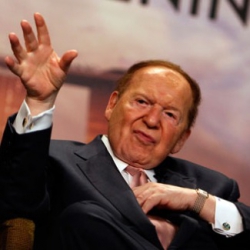Contrary to conventional wisdom when he took up the issue last year, Sheldon Adelson’s anti-online gambling campaign is beginning to pose a serious challenge. When he vowed to spend whatever it takes to ban online gambling throughout the United States, most people viewed the CEO of the Las Vegas Sands Corp. as an outlier on the issue.
Industry insiders scoffed that Adelson wanted to end Internet gaming, because he was concerned about problem gambling. Sheldon Adelson is the man who rose to become the 8th richest man on the planet through land-based casino gambling, which includes more than its share of gambling addicts. But Adelson claimed online gaming is easier, quicker, and more addictive than the form of gambling he plies.
Sheldon Adelson’s Plan
Despite his wealth, Adelson’s campaign appeared doomed to failure. He poured nearly $100 million into the 2012 U.S. Presidential race, hoping to forestall President Barack Obama’s reelection. He paid big money to various committees and super PACs, including Restore Our Future, Winning Our Future, the Congressional Leadership Fund, and the Republican National Commitee. The money went for naught, as Obama rolled to a relatively easy victory over GOP candidate Mitt Romney.
The spending in 2012 marked Sheldon Adelson as the Republican Party’s biggest donor, so it established him as a power broker inside the party. In the two years since, Adelson has bought Israeli newspapers and tried to influence politics in Israel towards a more hardline, conservative approach. Adelson supports Prime Minister Benjamin Netanyahu and the Likud Party. He’s spoken out on the need to take a hard stance against Iran’s nuclear weapons program, even advocating an airstrike by the Israeli Air Force.
Federal Government Eases Restrictions
Meanwhile, the Obama administration was clearing the way for legal interstate online gambling. In late 2011, the states of New York and Illinois asked the U.S. Justice Department for its opinion on the UIGEA passed in 2006, and which forms of gambling it covered under the 1961 Wire Act. The Department of Justice stated online sports betting was banned by the federal government, but online poker and casino gambling was not covered. This returned federal laws to a more conservative interpretation of the Wire Act, which covered only sports betting.
This opened the door for state-licensed online gambling. In 2012, Delaware approved online casinos and poker rooms for its three racecourses. In 2013, the states of Nevada and New Jersey each legalized intrastate iGaming. Rumors began to swirl that Illinois, New York, California, Massachusetts, Pennsylvania, Louisiana, and Oregon were exploring the idea of legalizing online gambling.
That is when Sheldon Adelson stepped in. He began to use his money at the state and federal level to support anti-gambling iniatitives. Several governors joined to support a ban of online gambling, including presidential hopefuls like Scott Walker and Rick Perry. He entertained several GOP presidential hopefuls in Las Vegas, vetting men like Jeb Bush, Chris Christie, John Kasick, and the aforementioned Scott Walker. In each discussion, iGaming was no doubt on the agenda.
Coalition to Stop Internet Gambling (CSIG)
Adelson’s Coalition to Stop Internet Gambling is a nationwide group determined to end ipoker and online casinos across the nation. They are the main group which handles lobbying, public relations, and strategy.
American Gaming Association Withdraws Support
Several trends are going against online gambling at this point. Recently, the American Gaming Association withdraw its active support from online gambling initiatives across the country. That is a tremendous blow to the movement, because the AGA represents the largest gaming companies in the United States. Corporations like MGM Resorts, Caesars Entertainment, Wynn Resorts, and Las Vegas Sands are represented on the board of directors.
That representation is why the AGA became a neutral in the online gambling issue. The board was split between the Las Vegas Sands faction and the MGM/Caesars faction, because the big casino brands cannot agree on whether Internet gambling is good or bad for their industry.
Steve Wynn Changes His Stance
Also changing his stance was Steve Wynn, who represents the other member of the big four US casino giants. In Wynn’s case, he stated no moral concerns, but concern that online gambling was a worthwhile investment. Seeing the poor numbers out of New Jersey likely had a lot to do with that decision.
The biggest factor againt online gambling legalization is the results so far. When iGaming was passed in New Jersey, Chris Christie claimed it would be worth $180 million per year in revenues for the state. Now it appears that the 2014 tax revenues are going to be closer to $12 million.
50-State Intiative
Other states considering licensed online gambling initatives may come to the same conclusion as Steve Wynn–it’s not worth the time and trouble. When a state considers the money and effort hiring more regulators, they might decide such an issue is not worth spending capital on it. This gives Sheldon Adelson the kind of facts-based arguments that could sway lawmakers.
Restoration of the Wire Act
That isn’t to say Sheldon Adelson is not going for the coup de grace. With his backing, Senator Lindsey Graham (R-South Carolina) and Representative Jason Chaffetz (R-Utah) introduced the bipartisan Restoration of the Wire Act bill. If passed this would ban all online gambling inside the United States, including the gaming activities in New Jersey, Nevada, and Delaware.

